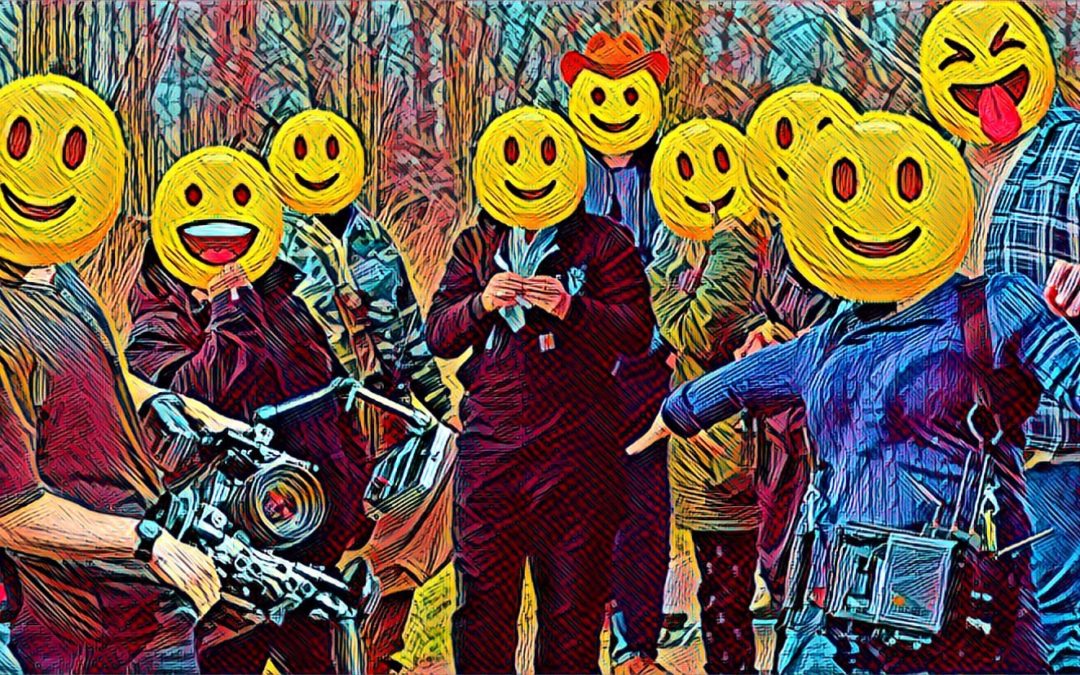As a director, it’s your job to not only carry the artistic vision of your film, but also take care of your people. Of course, you have a producer and an AD who are also looking out for crew safety and logistical efficiency. But in day to day set life, the director sets the tone.
You are the captain of the ship; everyone has put their confidence in you as their leader. That shouldn’t freak you out — it’s a privilege as much as it is a responsibility. Now here are five practical tools for keeping that confidence — and even increasing it!
1. Be nice
Niceness continues to be a trademark Lunacy value, and our head producer, Stu Pollard is great at it (but don’t tell him we said so). In every interaction, Stu leads with gratitude. “Thanks for bringing that to my attention,” or “Great question, let’s talk more,” are phrases that invite discussion and show appreciation for the contribution.
Eye contact, please, and thank you are still important in the fast-paced environment of a film shoot. Take a moment to celebrate crew birthdays or special occasions. Anything you can do to remind your team that they are appreciated. Remember, that you are a human first and a filmmaker second; niceness lays a civil foundation on which to build a healthy working relationship.
2. Share the victories
In this Film Independent article, co-directors Charlie Kaufman and Duke Johnson spoke about the laborious production process for their 2015 fantasy drama, Anomalisa. Dragging on for over three years, and continually running out of money, the project struggled to pay its crew on time.
Rather than ignoring the problem and hoping for the best, the directors showed everyone a rough edit of the first full scene. For the first time, the crew got a taste of the vision they were part of creating, coming away with a fresh sense of “buy-in.” It’s hard to keep everyone inspired over the course of a shoot, but reminding your crew that they are making something special will help.
3. Keep your cool (and apologize when you don’t)
When Craig Johnson was directing his first feature, True Adolescents, he had a moment with the crew that prompted an emotional outburst. It felt great for 30 seconds; then remorse set in. “When [crew members] see you losing your shit and screaming and yelling, there’s the sense that, ‘Oh God, is this whole thing falling apart? Am I on a sinking ship?’ And it’s just bad for morale.”
Craig found everyone who had witnessed his meltdown and personally apologized. When tensions rise, he now takes a deep breath, walks off set, and deals with his feelings privately. It’s natural to get overwhelmed, overtired, and frustrated. Expressing those emotions within earshot of your crew will only spread that negativity around.
4. Stop, collaborate, and listen
A first-time film director posted on the No Film School community boards, seeking advice. She received several responses, but this comment from DP Aidan Gray highlights the morale-killer that is micro-management.
“While people are there to help you create your vision, they’re also trying to add some of their style as well. You should see this as an advantage rather than a disadvantage. I once gaffed a shoot with a very “involved” director (to the point where he was controlling the specific colour temperature of our lights and managing the ISO on the camera) and it really brought the entire morale of the set down.”
It’s healthy in a collaboration to discuss differences of opinion and clearly communicate your vision. In the end, the final decisions will often rest with you, but make sure you keep an open mind and allow your team some creative freedom. Once you have done the hard work of hiring a great crew, trust them to do their jobs with excellence — they may surprise you!
5. Full crew = Happy crew
We could go on and on about food. Actually, we have.
One of the biggest mistakes you can make on a low budget film is to skimp on crafty. The way to anyone’s heart is through their stomach, especially when you consider how many calories your grips, gaffer, and even PAs are burning in the course of a day’s work.
It’s so easy to surprise and delight your crew with favorite meals and surprise snacks. Small things are special — gourmet coffee at 3pm, a well-timed delivery of grilled cheese squares, or mini PB&J sandwiches. When we were shooting Rust Creek it was so cold, and having a strong supply of hot soup available was huge.
Lastly, don’t forget to take care of yourself! Your own energy, sleep schedule, eating, and drinking are important as the leader of this outfit. And learn from those who do it well. Maintaining morale may seem like a distraction from the creative work that got you involved in this project, but it’s critical to getting the job done.

